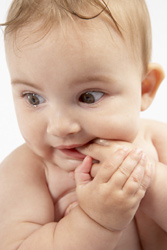Caring for Baby Teeth
Did you ever hear someone say, “I don’t understand why you’re making such a big fuss, they’re only baby teeth!”
Some people believe that baby teeth don’t really matter because they’re just going to fall out anyway! Well, a participating dentist in your area knows better! Baby teeth need just as much attention as adult teeth; they’ll be happy to explain why when you call their office.

Sucking on a hand or fingers is one way to tell your child is teething.
Here are some of the more common questions that new parents ask us concerning their baby’s dental care:
When should I start caring for my baby’s teeth?
Even before your baby’s first teeth erupt, you can clean your baby’s gums by rubbing them after each meal with a clean washcloth.
How do I know when my baby is teething?
Most babies start to teethe at about six months of age or later. Some go through the process with very little discomfort, while others experience pain and increased irritability or fussiness.
Symptoms of teething include:
- Increased saliva production with drooling
- Biting on the hand or other hard object
- Decrease in normal appetite
- Increased irritability/crying
- Swollen or tender gums
How can I ease my child’s teething pain?
While many parents of the past used a whiskey-soaked rag to numb teething pain, we certainly do not recommend this treatment!
What we do recommend? Cold water-soaked washcloths, a cold teething ring or rubbing your baby’s gums with a clean finger or an over-the-counter topical anesthetic for temporary pain relief.
What about thumb sucking?
It’s normal for children to have the need to suck on their thumb, fingers or a pacifier, with no harm done up until the age of 6 when permanent teeth begin to erupt.
Most children will give up the sucking habit by age four; if you are concerned about your child, please mention this to your dentist so they can note the need to keep a watchful eye as your child’s teeth continue to develop.
My child still takes a bottle – how old is too old?
We suggest that you try to wean your baby from a bottle by the age of 14 months. Never allow your child to take a bottle to bed, as any liquid that is in the bottle can cause tooth decay if it remains in the child’s mouth after he/she falls asleep.
You should strongly encourage your child to drink from a cup at the age of one year.
When should I make my child’s first dental appointment?
Prevention is always best and you dentist will encourage you to bring your child in for an examination by the time of their first birthday.
An examination of your child’s first teeth for signs of early decay that can result from nap-time/night-time bottle feeding or continuous nursing when breast milk is allowed to sit in the child’s mouth.
Bringing your child to a dentist from an early age also helps him/her to feel comfortable with the dentist and helps to establish the practice of preventative routine dental care.

